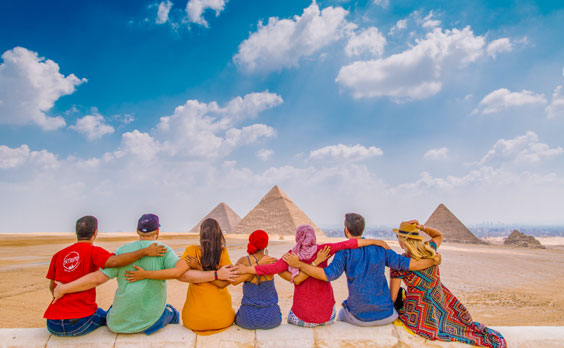
The future of travel: Sharing solutions, rebuilding responsibly

LEIGH BARNES,
Chief Customer Officer,
Intrepid Travel
What are some of the ways you think the travel industry will be different post COVID-19?
While this pandemic has been devastating in so many ways, it has also provided the tourism industry with the opportunity to reflect on the things we could be doing better – for travellers, suppliers, local communities, and the planet. Travellers will also be reflecting on how they live and travel post COVID-19. With most people spending a good portion of 2020 indoors, travellers that may have previously opted for an urban setting may now want to get outdoors and stay active with tours centered around cycling, trekking and mindfulness.
COVID-19 has brought global travel and transport to a standstill, which has resulted in a dramatic drop in carbon emissions globally. In 2019, customers were increasingly expecting travel companies to take climate action. It’s not an issue that will disappear during this hibernation period. Post COVID-19, travellers will be looking for companies to demonstrate their sustainability credentials.
One of the silver linings of coronavirus has been the reports of fish returning to the canals of Venice and the biggest boost to numbers of rare leatherback sea turtles in two decades after Thailand’s beaches were emptied of tourists.
These stories once again put a spotlight on overtourism.
We fundamentally believe that travel can only rebound stronger if it rebuilds more responsibly. Tour operators, together with local governments and destination management offices, need to work together. Now is the time for the industry to share solutions.
 What about for tour operators in particular?
What about for tour operators in particular?
Once the COVID-19 situation begins to subside and travellers are ready to start thinking about their next adventure, tour operators will need to be honest, open and clear in their communications, particularly around how they plan to run their tours to ensure safety and how they would handle a health concern within a group.
In a post-coronavirus reset of the touring sector, small group travel will become the new norm. For 31 years, Intrepid Travel has focused on small group tours, with local leaders.
We believe that it will be travel companies that are most connected with their local communities who will be best placed to provide real reassurance when travel returns. The coronavirus crisis has reinforced the importance of our local destination management companies and their relationships with our local suppliers. As travel restrictions were rapidly changing, Intrepid’s tour leaders and local operations teams had the knowledge and the contacts to quickly adapt plans and the connections with governments when further support was needed to get travellers home safely. Our suppliers helped us to help our travellers when they needed it most. For example, our transport suppliers in Morocco gave us buses to ferry travellers between Casablanca and Marrakech as flights were canceled and rescheduled. In Peru, we were provided with entire hotels that became dedicated hubs for our travellers.
We understand that once our customers start to travel again, they will want to know that we will continue to meet high safety standards in all aspects of our trips, be it the local accommodation we offer, the local restaurants we eat at, or the equipment we use on our active tours, for example. We have a global network of local offices who will be working with our partners on the ground to ensure our customers and our communities are safe.
One of the biggest challenges is not knowing when travel will be a go again. How are you handling this?
We’ve paused all our trips globally until Sept. 30, 2020. That decision is based on the likelihood that international borders will remain closed for an extended period of time. Domestic travel will come back first as people will feel more confident with their own government’s assurances and precautions to feel comfortable to explore their own backyard. International travel will begin to make a comeback this year, but much of it may depend on the politics around the reciprocal opening of borders between nations. We’re expecting to see travellers return as quickly as they can to places like Australia, New Zealand, and Vietnam that are leading the way with their management of COVID-19. But Intrepid travellers are more resilient than most. Many of our travellers have been spending their time in lockdown booking their bucket list trips for 2020 and 2021. The most popular places to go? Morocco, Peru, Australia, Antarctica and the Galapagos.
Do you have any advice on how to overcome some of these hurdles or regain consumer confidence in travelling?
Good governance and strong health and safety practices will be more important than ever in establishing consumer trust. We will be taking extra care to ensure all our trips meet the highest standards. We’re currently reviewing best practices with our suppliers and looking at things like contactless check-in processes and increased transparency on hygiene. I think what’s needed will become clearer in the coming weeks. Transparency will be key to establishing and maintaining trust. External certifications that demonstrate a company’s commitment to the safety and well-being of their customers – in addition to the planet and the communities they visit – will become an important marker of trust to build consumer confidence. For example, a B Corporation certification tells customers that the company is committed to consider the impact of their decisions on their customers, workers, suppliers, community, and the environment.
Do you have anything to add?
The world has changed dramatically over the past few months and many people are suffering huge personal losses in more ways than one. This pandemic has proved that the most vulnerable people tend to be impacted the most by the worldwide cessation of travel. The homestay hosts in Peru or local safari guides in Kenya will not be given bailouts like major airlines and hotels. The locally-owned restaurants, contracted tour leaders, homestay hosts – all of these people rely on foreign tourists to support themselves and their families. The best way for us to continue to support our local suppliers is to run a good business and to start travelling again when it is safe to do so.

